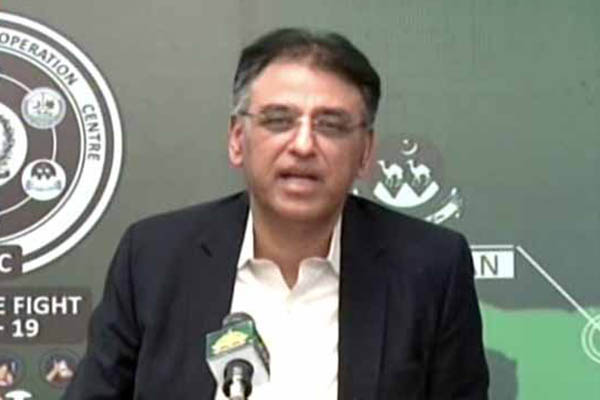
File photo of Planning Minister Asad Umar
In meeting, participants support ramping up media campaign to ensure public does not become complacent about pandemic
A meeting of the National Command and Operation Center (NCOC) on Thursday backed an aggressive media campaign to increase public awareness about the ongoing threat from the novel coronavirus so public complacency does not result in a second wave of the disease.
Chaired by Planning Minister Asad Umar, the forum was informed that Pakistan’s declining daily infections had resulted in visible complacency among citizens, with many no longer wearing face masks in public places, and violating social distancing guidelines. The meeting’s participants said the government should expand ongoing media campaigns on the threat of COVID-19, adding the new messaging should focus on informing the public that the disease remained a threat and could only be managed through standard operating procedures (SOPs).
In addition to the media campaign, the forum also discussed the epidemic curve of the virus; recommendations for the National Coordination Committee to remove additional sectors from the negative list; and SOPs to reopen educational institutions.
The NCOC was informed that in mid-June, when new infections were surging, the government had decided to add 2,150 oxygenated beds to increase the capacity of hospitals nationwide. It said that following visits to all affected regions by special teams, it had been decided to increase this number to 2,850.
Thus far, said the NCOC, 2,608 new oxygenated beds had been added to hospitals across Pakistan, including 80 in Pakistan-administered Kashmir; 264 in Balochistan; 100 in Gilgit-Baltistan; 400 in Khyber-Pakhtunkhwa; 787 in Punjab; 351 in Sindh; and 626 in Islamabad. It said efforts were underway for the addition of the remaining 242 oxygenated beds—10 in Khyber-Pakhtunkhwa, 17 in Punjab and 215 in Sindh.
In addition to chair Umar, Interior Minister Ijaz Shah, Special Assistant to the Prime Minister on Health Dr. Faisal Sultan, National Food Security Minister Fakhar Imam, Education Minister Shafqat Mahmood, Economic Affairs Minister Khusro Bakhtiyar, Industries Minister Hammad Azhar, and other senior officials also attended the meeting.
